Puffing in real estate contracts refers to exaggerated or subjective statements made by sellers or agents to make a property seem more appealing. While puffing is generally legal and considered a harmless sales tactic, it involves opinions rather than factual claims. However, home buyers should be cautious because puffing differs from misrepresentation, which involves false statements and can lead to serious legal consequences. Understanding these distinctions helps buyers navigate property purchases with clarity, ensuring they conduct thorough due diligence and avoid relying solely on inflated claims in contracts or advertising. This knowledge protects their interests and promotes informed, confident decision-making when buying a modern home.
What Is Puffing in Real Estate?

Puffing in real estate refers to the practice of using exaggerated praise or hype to sell a property, but it’s not intended to be taken as a factual representation. Think of it like a salesperson at a car dealership saying, “This is the fastest car on the planet!” – it’s probably an opinion, not something you can hold them to. In real estate, this is often evident in listings that feature phrases such as “dream home” or “unbeatable location.” Puffing in real estate refers to the use of subjective opinions that lack evidence, making it a common marketing tactic.
Common examples of puffing in modern real estate include statements like “this neighborhood is the safest around” or “the kitchen is in perfect condition.” These are subjective and based on personal views, not measurable facts. Why is puffing such a gray area legally? Because laws often protect free speech in advertising, as long as it’s not deceptive. As a buyer, you may hear these statements frequently, but relying on them without verification can lead to disappointment. Imagine buying a house based on a seller’s claim that it’s “move-in ready,” only to discover that it requires significant repairs. That’s why understanding the meaning of puffing in real estate is your first step to smarter home buying.
Puffing in Real Estate: The Legal Perspective
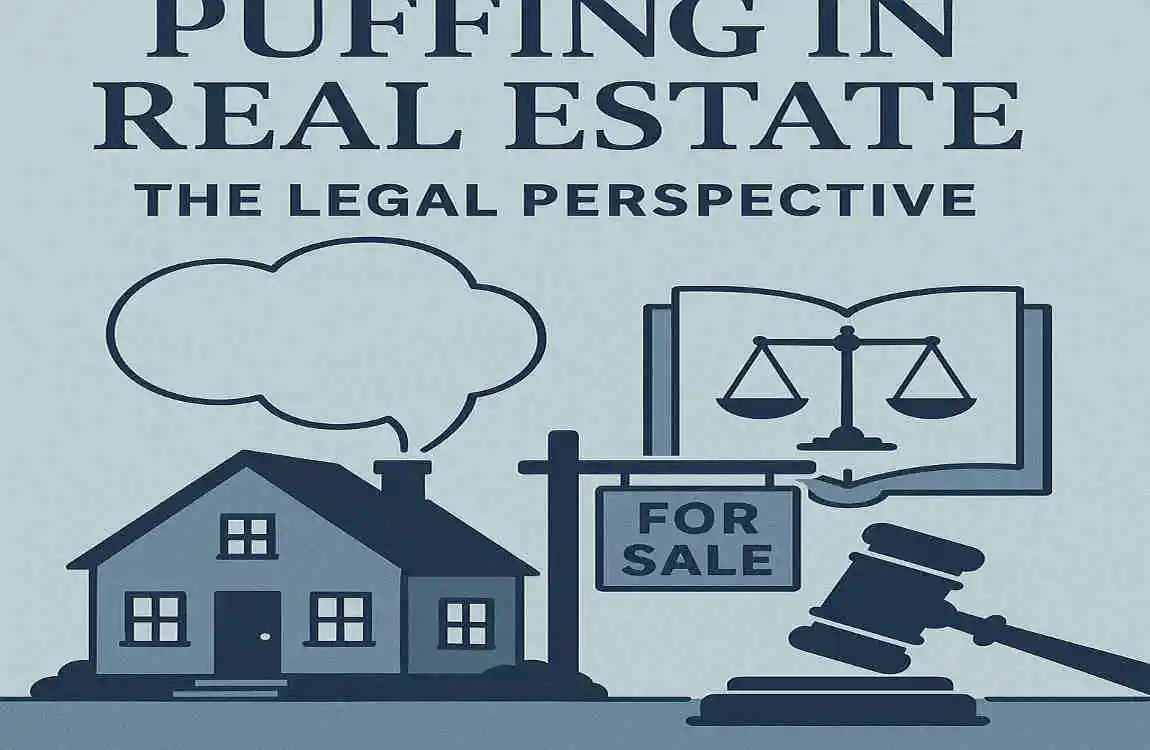
When it comes to the law, puffing in real estate means varies by jurisdiction, but most places treat it as non-actionable, meaning you probably can’t sue over it. In the U.S., for instance, courts often distinguish between opinions and facts. Opinions, like puffing, are protected under free speech, while facts must be accurate to avoid legal trouble. This concept is rooted in contract law, where statements are evaluated based on whether they’re verifiable or just sales talk.
Key legal concepts include understanding the difference between puffery and factual claims. For example, saying a house beautiful is an opinion, but claiming it was “recently renovated” implies a fact that can be checked. Case laws help clarify this: in the famous U.S. case Vokes v. Arthur Murray, Inc., courts ruled that exaggerated promises in sales aren’t binding if they’re clearly puffing. Similarly, in real estate, precedents indicate that statements like “best investment ever” are typically dismissed as puffery; however, if they lead to financial harm, they may be challenged.
Typical Puffing Statements in Real Estate Contracts
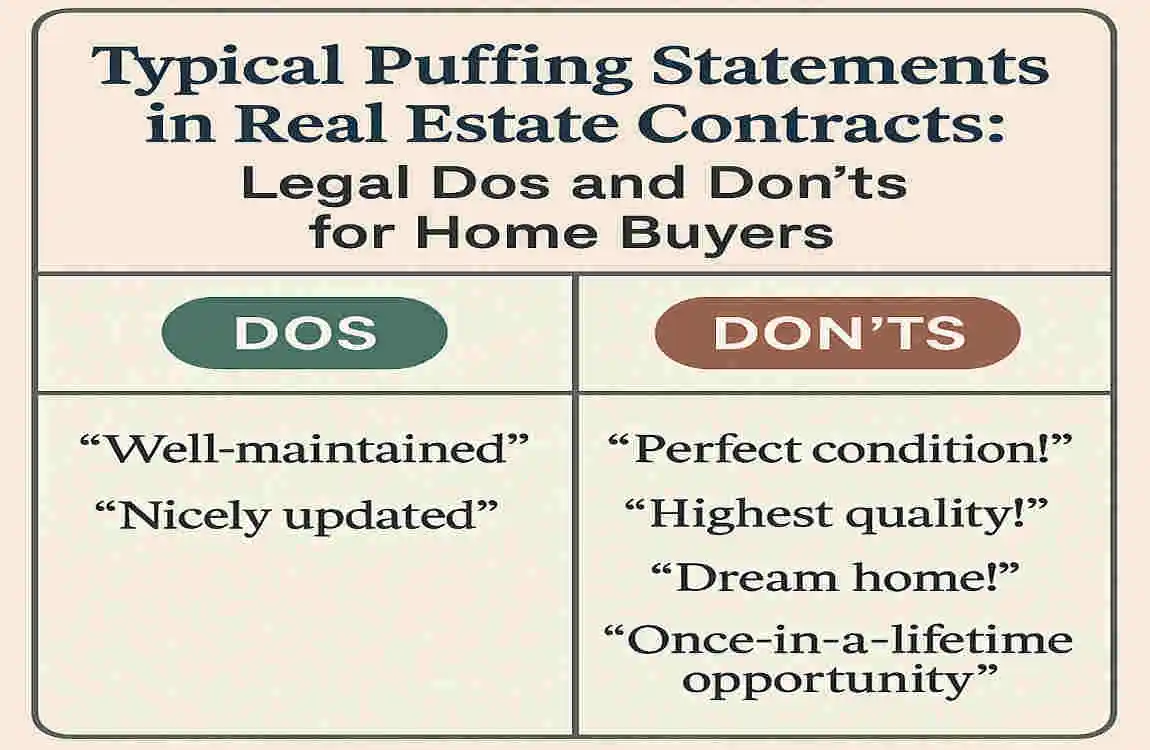
In designed real estate contracts, puffing often appears as flowery language designed to entice buyers. Phrases like “ideal family home,” “prime location,” or “move-in ready” are classic examples of this. These statements are typically considered opinions because they’re subjective and can’t be easily proven wrong. For instance, what one person sees as a “prime location” might be too noisy for someone else.
The Risks of Puffing for Home Buyers
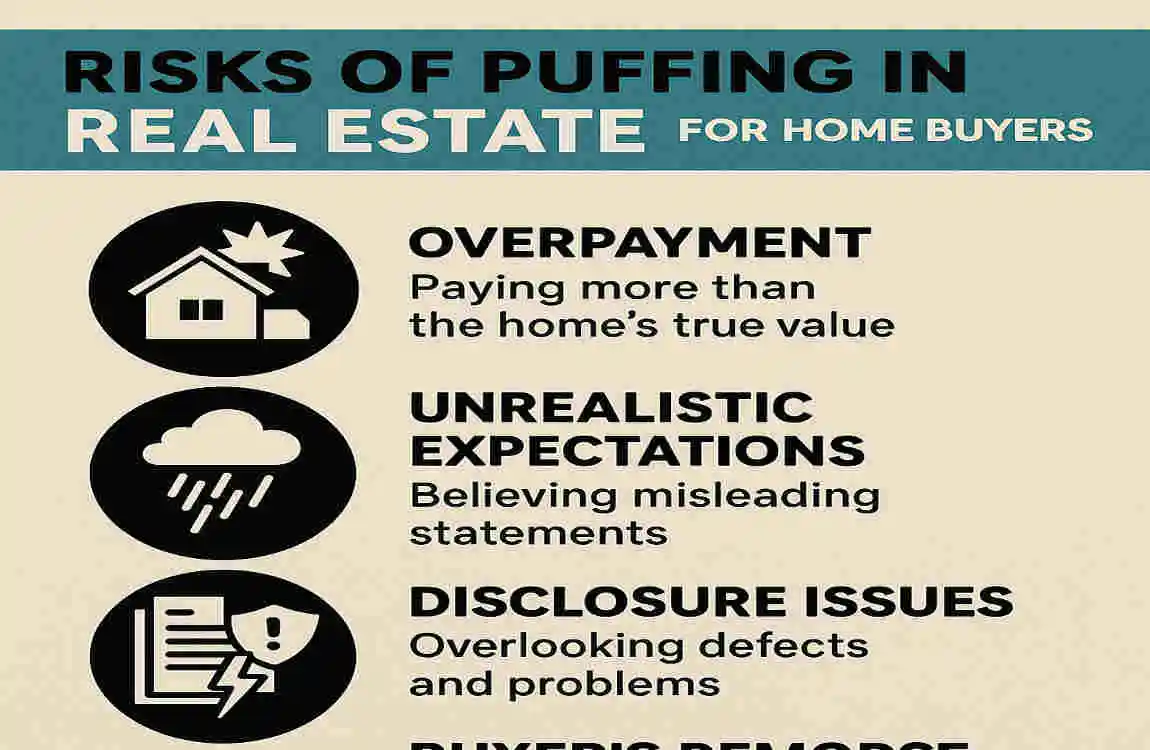
Relying on puffery statements can lead to real problems for modern home buyers. For starters, you might overpay for a property based on hype that’s not backed by reality. If an agent boasts about a “booming neighborhood,” but it turns out to be undervalued, you could face a loss when you try to sell. Disputes often arise when buyers feel misled, leading to costly legal battles or even voided contracts.
In the worst cases, puffing may contribute to larger issues, such as fraud, especially when combined with the omission of facts. This can impact your financial stability, from unexpected repair costs to a decrease in house property value. By recognizing puffing early, you can mitigate these risks and make more informed choices.
Legal Dos for Home Buyers Regarding Puffing
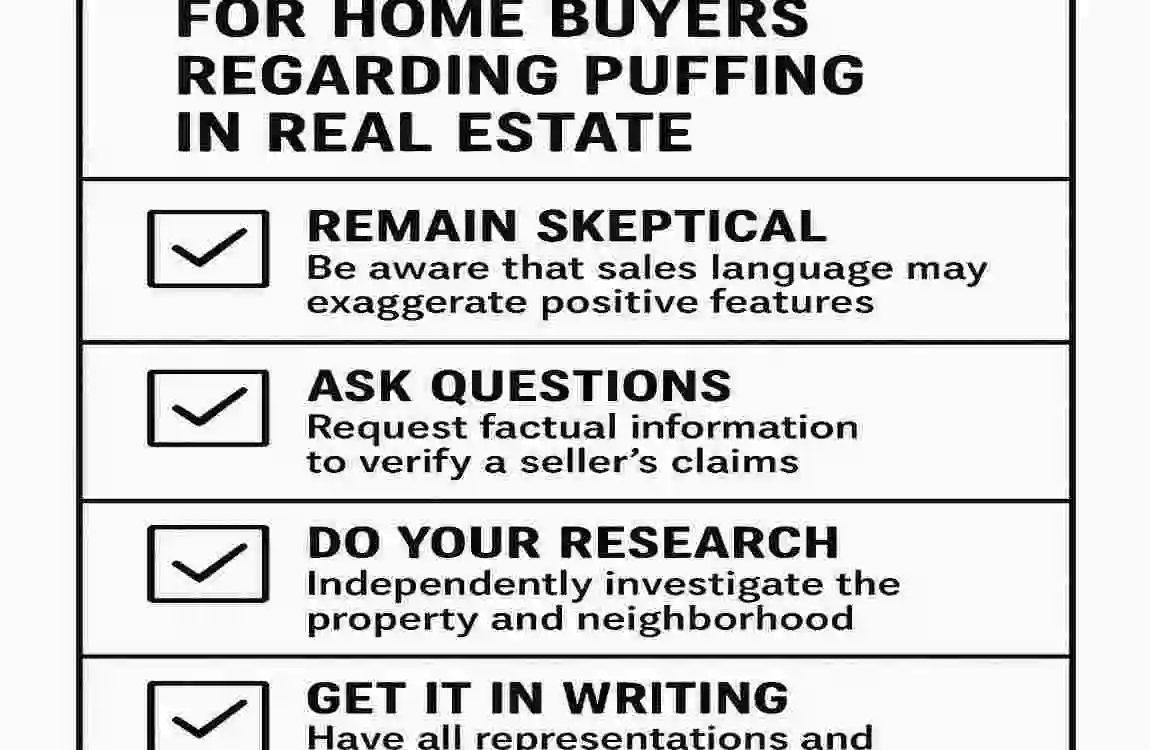
As a luxury home buyer, there are smart steps you can take to handle puffing effectively. First and foremost, always carefully review all statements and claims in the contract. Don’t just skim through—read every word and question anything that sounds overly promotional. This helps you distinguish between hype and helpful information.
Second, seek professional advice from real estate agents, lawyers, or home inspectors. These experts can identify potential puffing and offer objective insights. For example, an inspector might verify if a “perfect condition” claim holds water.
Legal Don’ts for Home Buyers Regarding Puffing
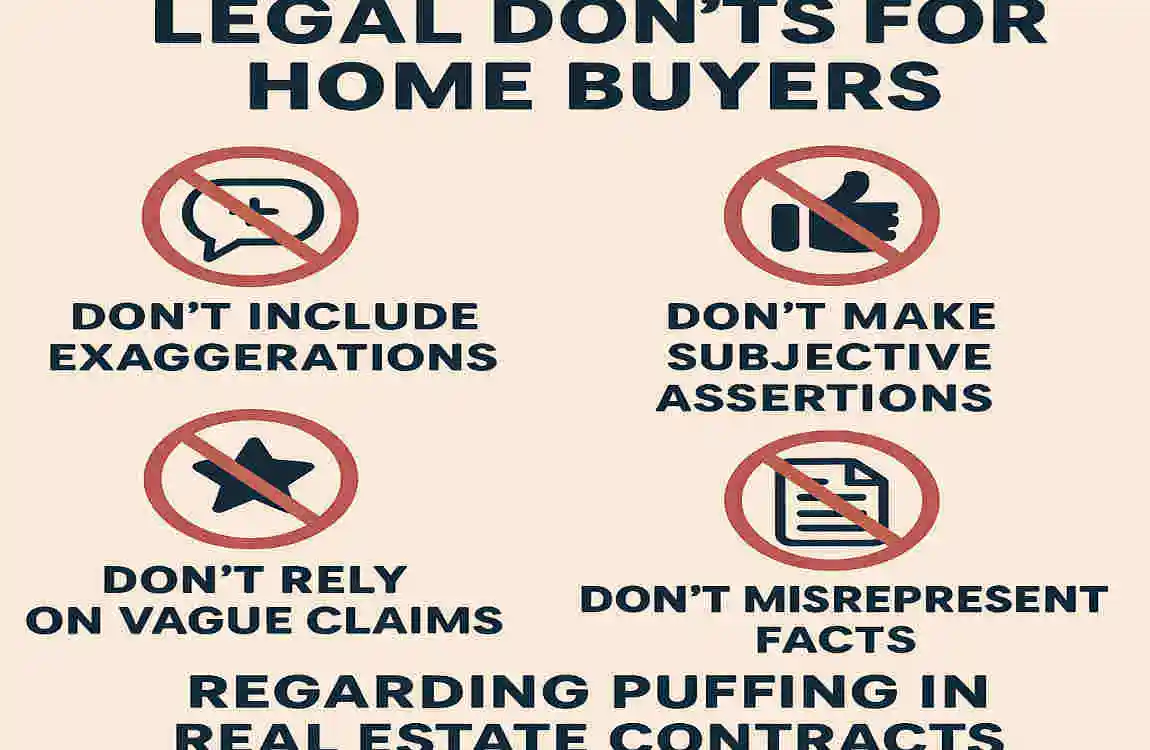
On the flip side, there are definite don’ts when it comes to puffing in luxury real estate. First, don’t rely solely on promotional statements without verification. It’s tempting to get swept up in exciting descriptions, but always back them up with facts. For instance, if a listing claims to be in the “best school district,” research it independently to verify the claim.
Second, don’t ignore red flags or vague language in contracts. Words like “approximately” or “could be” often signal puffing or potential issues. Spotting these early can prevent future house disputes.
Avoiding these don’ts is crucial for protecting your interests. Here’s a simple list to remember:
- Don’t trust hype alone: Always seek evidence for claims.
- Don’t overlook details: Vague terms can conceal more significant issues.
- Don’t rush decisions: Pressure tactics are a common sign of potential issues.
- Don’t skip due diligence: Verify, verify, verify!
Sticking to these guidelines will help you navigate contracts more safely.
How to Protect Yourself From Puffing in Real Estate Transactions
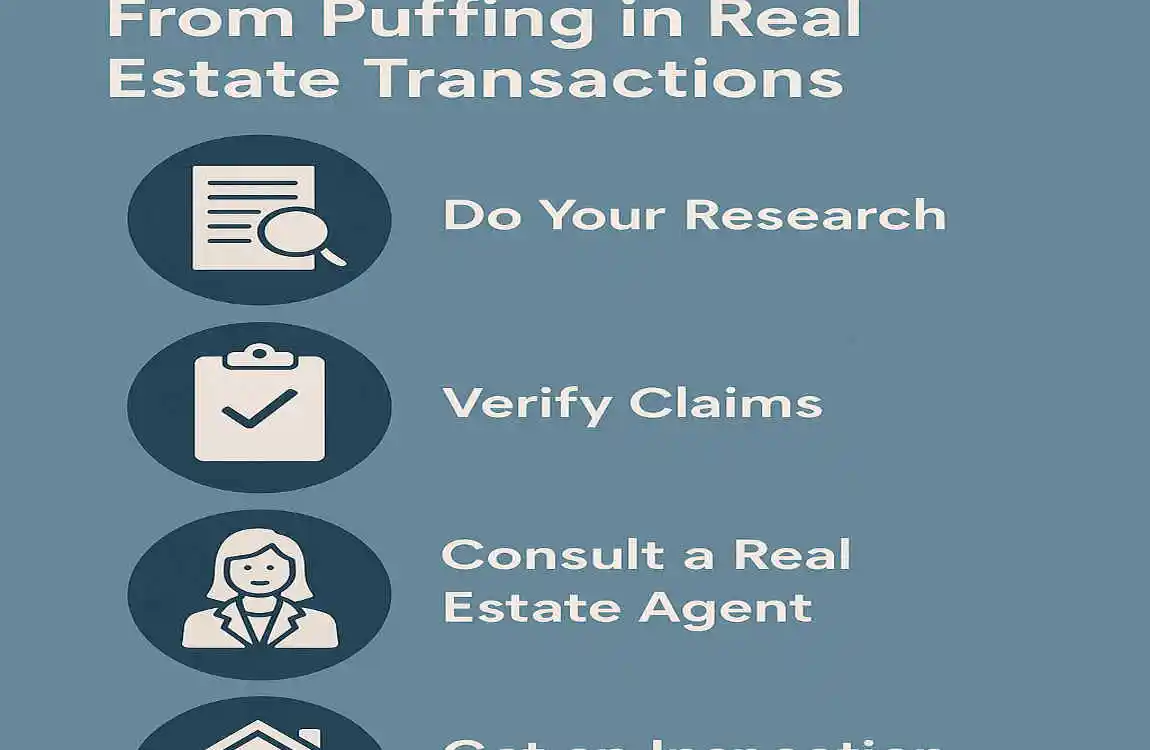
Protecting yourself from puffing starts with being proactive and informed. One practical tip is to learn how to distinguish between puffing and factual statements—puffing is typically emotional and subjective, whereas facts are specific and verifiable. For example, “stunning views” is puffing, but “oceanfront property with 100 feet of beach access” is a fact real estate.
Real estate agents have responsibilities too—they must avoid misleading statements and provide accurate information. If an agent uses puffing excessively, it could harm their credibility. To involve you directly, consider your own buying process: Are you asking the right questions? By doing so, you can spot puffing before it becomes a problem.
For a more precise comparison, here’s a table to help you distinguish between puffing and factual statements:
Type Example Statement: Why It’s Puffing or Fact, How to Verify
Puffing, “This is the best house in the neighborhood.” Subjective opinion, not measurable. Can’t be verified; rely on your own judgment.
Factual Statement: “The house roof was replaced in 2023 with a 30-year warranty.” Specific and provable detail. Check records, warranties, or the inspector’s report.
Puffing “Perfect for entertaining guests.” Vague and based on personal use. Assess the space yourself during a visit.
Factual Statement: “The home has a 500 sq ft patio with a built-in grill.” Quantifiable and objective. Measure the area or review blueprints.
Using tools like this table can make contract reviews less overwhelming and more effective.
FAQ: What Does “Puffing” Mean in Real Estate?
Q: What is puffing in real estate?
Puffing refers to extravagant or exaggerated claims made by real estate agents or sellers to attract buyers. These statements are often subjective opinions, such as calling a property “the best house on the block” or “a dream home” .
Q: Is puffing illegal in real estate?
No, puffing is not illegal because it is typically considered an opinion rather than a factual misrepresentation. However, it is important to distinguish puffing from misrepresentation, which involves false or misleading statements about a property and can lead to legal consequences .
Q: What are some examples of puffing in real estate?
Examples of puffing include:
- “This house has the best view in the neighborhood!”
- “The kitchen is absolutely perfect for entertaining.”
- “This property is a once-in-a-lifetime opportunity.”
These statements are subjective and not verifiable facts.
Q: How is puffing different from misrepresentation?
- Puffing: Subjective opinions or exaggerations that are not meant to deceive (e.g., “This is the coziest home you’ll ever find”).
- Misrepresentation: False or misleading statements about a property’s condition or features (e.g., claiming a roof is new when it is not).
Q: Why should buyers be cautious about puffing?
While puffing is legal, buyers should be cautious because it can create unrealistic expectations. Always verify claims by:
- Conducting a home inspection.
- Asking for documentation (e.g., warranties, permits).
- Consulting with a real estate professional.
Q: Can puffing impact real estate transactions?
Yes, puffing can influence a buyer’s perception of a property. However, since it is not legally binding, buyers cannot typically hold sellers or agents accountable for exaggerated opinions.




